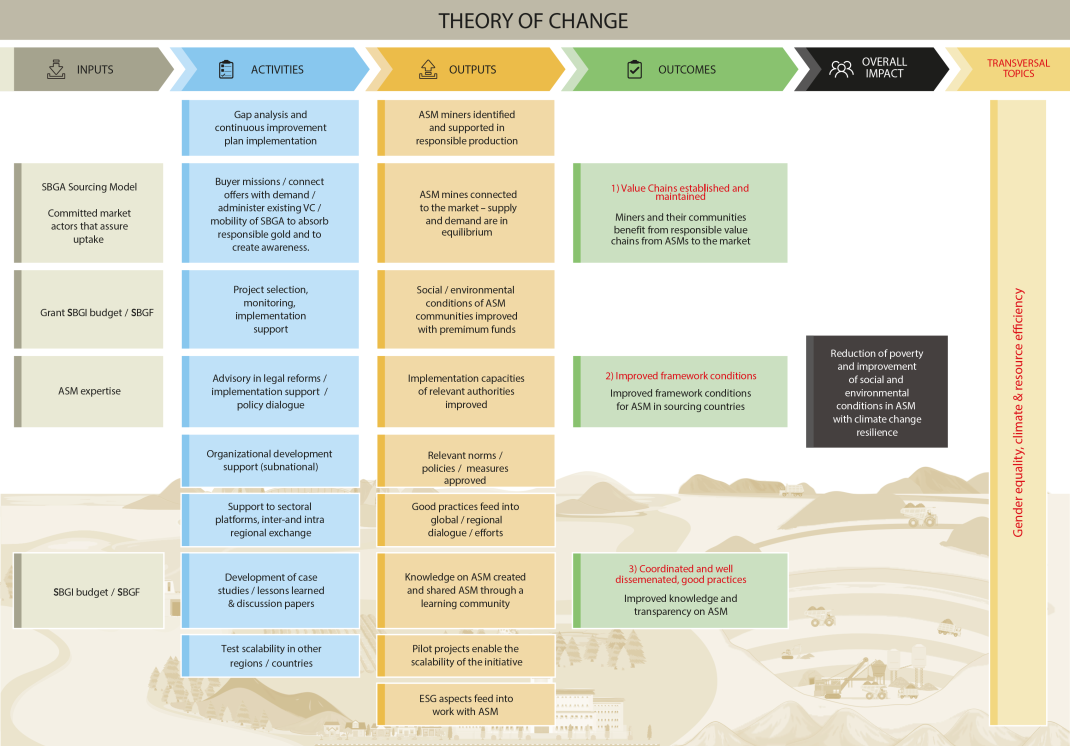The term “artisanal and small-scale gold mining” (ASGM) refers to low technology and highly labour-intensive gold mining activities that employ basic extraction and processing methods.
Artisanal and Small-Scale Mining (ASM, gold and other minerals) generates employment and income for over 44 million workers worldwide, feeding around 100 million people, including families and various service providers. Artisanal and small-scale gold mining (ASGM) offers a livelihood for more than 20 million men and women and, as the source of 20% the global gold production, has the potential to act as an economic engine to drive the sustainable development of mineral-endowed communities.
The sector, however, does not come without its challenges, often characterised by informal operations, widespread use of mercury, hazardous working conditions, child labour and, in some instances, conflict financing and money laundering. A significant share of ASGM producers are marginalised and endure a precarious financial situation: they are particularly affected by fluctuations in gold prices, unfavourable sale conditions imposed by intermediaries and have limited or no access to basic financial services.
Fully aware that disengagement from ASGM sources would fail to address the root causes of these challenges, together with the Swiss State Secretariat for Economic Affairs (SECO), the Swiss Better Gold Association and its members created the Swiss Better Gold Initiative for Artisanal and Small-Scale Mining (ASM).
Learn more about the Swiss Better Gold Initiative's theory of change. The theory of change is a result of the last external evaluation of Swiss Better Gold, and emerged from a discussion between the key stakeholders involved.

The Swiss Better Gold Initiative for Artisanal and Small-Scale Mining purpose is to have an inclusive approach and collectively turn ASM producers into a force for good by:
1. Providing technical support and training
2. Channelling direct financial investment in mine safety & improving productivity
3. Offering fair business terms & an additional incentive for community development projects
Typology of Swiss Better Gold Mines
The OECD defines ASM as artisanal and small-scale mining comprised of “formal or informal mining operations with predominantly simplified forms of exploration, extraction, processing, and transportation. ASM is normally low capital intensive and uses high labour-intensive technology. “ASM” can include men and women working on an individual basis as well as those working in family groups, in partnership, or as Members of cooperatives or other types of legal associations and enterprises involving hundreds or even thousands of miners. For example, it is common for work groups of 4-10 individuals, sometimes in family units, to share tasks at one single point of mineral extraction (e.g. excavating one tunnel). At the organisational level, groups of 30 – 300 miners are common, extracting jointly one mineral deposit (e.g. working in different tunnels), and sometimes sharing processing facilities”. (OECD Due Diligence Guidance for Responsible Supply Chains of Minerals from Conflict-Affected and High-Risk Areas, pg. 65 [Accessed on 27.06.2023])
Swiss Better Gold has taken an inclusive, open and pragmatic approach, focussing on enabling artisanal and small-scale miners access to international markets. The Swiss Better Gold approach includes:
- providing technical assistance to support producers to achieve the initial sourcing criteria and then progress on the SBG Continuous Improvement Escalator.
- establishing supply chains with its downstream Members, collecting from such Member a USD 1 per gram impact premium.
- reinvesting the impact premium in social and environmental projects on the ground jointly with its partner mines.
Swiss Better Gold supports the following types of producers:
- Artisanal gold panners (called ‘barequeros’ in Colombia): miners who work independently (each person is considered a production unit) and live from extracting gold using traditional methods and mostly working by hand, usually on riverbanks.
- Small-scale mines: operations owned and run by men or women working on an individual basis as well as those working in family groups, small enterprises, cooperatives, and other types of entities, potentially involving hundreds of individuals. These organisations do not always structurally rely on permanent hired labour, have simplified forms of extraction, processing and transportation, low capital intensity (little mechanisation) and high labour-intensive technology (panning, hand-picking, and crushing).
- In exceptional cases Swiss Better Gold also works with large-scale mines that have artisanal or small-scale producers on their sites. In this scenario, only the mineral from the artisanal or small-scale producers is incorporated into the Swiss Better Gold supply chain.
- Medium-scale mines: co-operative, association, or a private company. These organisations structurally rely on permanent hired labour and partial mechanisation of some activities during exploration, extraction, processing and transportation. Swiss Better Gold works with medium-scale mines if there are artisanal or small-scale operations working on or nearby the mine’s concession, which deliver their ore to the mine for processing and commercialisation. In this case, Swiss Better Gold focusses on the integration of these artisanal or small-scale producers in Swiss Better Gold supply chains, supporting them with technical assistance in relevant activities, such as Occupational Health and Safety. Swiss Better Gold might also engage with medium-scale mines if there is a considerable social/environmental impact to be achieved through the generation of the Swiss Better Gold premium.
In 10 years of activity (2013 - 2023), Swiss Better Gold was able to:
- Support supply chains for a total of 15 tons of gold between ASM producers and Swiss Better Gold Members.
- Implement 46 social and environmental impact projects with a direct contribution of USD 6’000’000 with a vast range of gold ASM producers.
